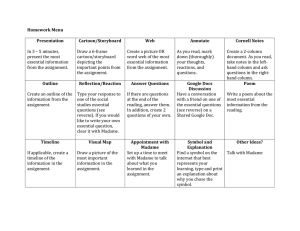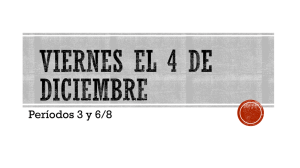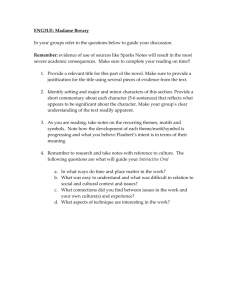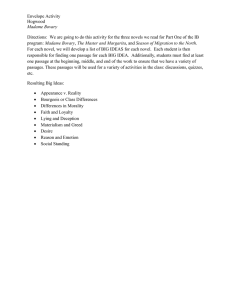Ernest Hemingway From A Farewell to Arms
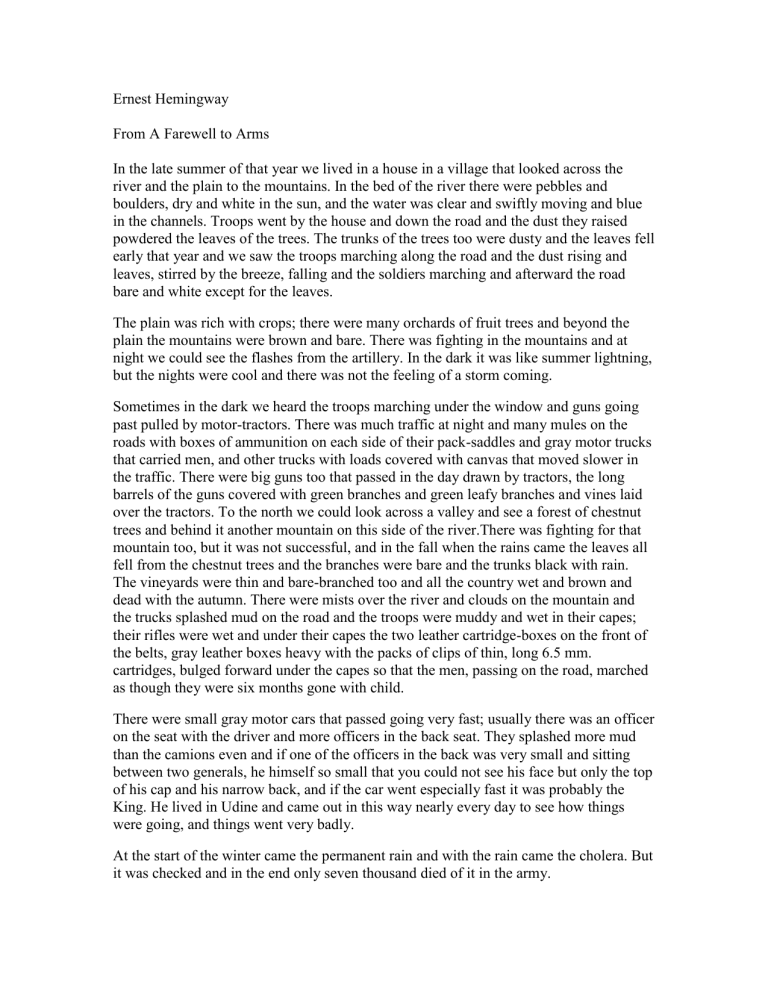
Ernest Hemingway
From A Farewell to Arms
In the late summer of that year we lived in a house in a village that looked across the river and the plain to the mountains. In the bed of the river there were pebbles and boulders, dry and white in the sun, and the water was clear and swiftly moving and blue in the channels. Troops went by the house and down the road and the dust they raised powdered the leaves of the trees. The trunks of the trees too were dusty and the leaves fell early that year and we saw the troops marching along the road and the dust rising and leaves, stirred by the breeze, falling and the soldiers marching and afterward the road bare and white except for the leaves.
The plain was rich with crops; there were many orchards of fruit trees and beyond the plain the mountains were brown and bare. There was fighting in the mountains and at night we could see the flashes from the artillery. In the dark it was like summer lightning, but the nights were cool and there was not the feeling of a storm coming.
Sometimes in the dark we heard the troops marching under the window and guns going past pulled by motor-tractors. There was much traffic at night and many mules on the roads with boxes of ammunition on each side of their pack-saddles and gray motor trucks that carried men, and other trucks with loads covered with canvas that moved slower in the traffic. There were big guns too that passed in the day drawn by tractors, the long barrels of the guns covered with green branches and green leafy branches and vines laid over the tractors. To the north we could look across a valley and see a forest of chestnut trees and behind it another mountain on this side of the river.There was fighting for that mountain too, but it was not successful, and in the fall when the rains came the leaves all fell from the chestnut trees and the branches were bare and the trunks black with rain.
The vineyards were thin and bare-branched too and all the country wet and brown and dead with the autumn. There were mists over the river and clouds on the mountain and the trucks splashed mud on the road and the troops were muddy and wet in their capes; their rifles were wet and under their capes the two leather cartridge-boxes on the front of the belts, gray leather boxes heavy with the packs of clips of thin, long 6.5 mm. cartridges, bulged forward under the capes so that the men, passing on the road, marched as though they were six months gone with child.
There were small gray motor cars that passed going very fast; usually there was an officer on the seat with the driver and more officers in the back seat. They splashed more mud than the camions even and if one of the officers in the back was very small and sitting between two generals, he himself so small that you could not see his face but only the top of his cap and his narrow back, and if the car went especially fast it was probably the
King. He lived in Udine and came out in this way nearly every day to see how things were going, and things went very badly.
At the start of the winter came the permanent rain and with the rain came the cholera. But it was checked and in the end only seven thousand died of it in the army.
Abraham Lincoln
Abraham Lincoln’s Gettysburg Address (1863)
Fourscore and seven years ago our fathers brought forth on this continent a new nation, conceived in liberty and dedicated to the proposition that all men are created equal.
Now we are engaged in a great civil war, testing whether that nation, or any nation so conceived and so dedicated, can long endure. We are met on a great battle-field of that war. We have come to dedicate a portion of that field as a final resting-place for those who here gave their lives that that nation might live. It is altogether fitting and proper that we should do this.
But in a larger sense, we cannot dedicate—we cannot consecrate—we cannot hallow—this ground. The brave men, living and dead, who struggled here, have consecrated it far above our poor power to add or detract. The world will little note nor long remember what we say here, but it can never forget what they did here. It is for us, the living, rather, to be dedicated here to the unfinished work which they who fought here have thus far so nobly advanced. It is rather for us to be here dedicated to the great task remaining before us—that from these honored dead we take increased devotion to that cause for which they gave the last full measure of devotion; that we here highly resolve that these dead shall not have died in vain; that this nation, under God, shall have a new birth of freedom; and that government of the people, by the people, for the people, shall not perish from the earth.
Sarah Vowell:
See her essay in Contemporary Creative Nonfiction : “What He Said There” (130-133).
Henry James
From What Maisie Knew (1897)
She was ready, in this interest, for an immense surrender, a surrender of everything but
Sir Claude, of everything but Mrs. Beale. The immensity didn’t include them; but if he had an idea at the back of his head she had also one in a recess as deep, and for a time, while they sat together, there was an extraordinary mute passage between her vision of this vision of his, his vision of her vision, and her vision of his vision of her vision. What there was no effective record of indeed was the small strange pathos on the child’s part of an innocence so saturated with knowledge and so directed to diplomacy. What, further,
Beale finally laid hold of while he masked again with his fine presence half the flounces of the fireplace was: ‘do you know, my dear, I shall soon be off to America?’ It struck his daughter both as a short cut and as the way he wouldn’t have said it to his wife. But his wife figured with a bright superficial assurance in her response.
‘Do you mean with Mrs. Beale?’
Her father looked at her hard. ‘Don’t be a little ass!’
Her silence appeared to represent a concentrated effort not to be. ‘Then with the
Countess?’
‘With her or without her, my dear; that concerns only your poor daddy. She has big interests over there, and she wants me to take a look at them.
Maisie threw herself into them. ‘Will that take very long?’
‘Yes; they’re in such a muddle—it may take months. Now what I want to hear, you know, is whether you’d like to come along?’
Planted once more before him in the middle of the room she felt herself turning white. ‘I?’ she gasped, yet feeling as soon as she had spoken that such a note of dismay was not altogether pretty. She felt it still more while her father replied, with a shake of his legs, a toss of his cigarette-ashe and a fidgety look—he was for ever taking one—all the length of his waistcoat and trousers, that she needn’t be quite so disgusted. It helped her in a few seconds to appear more as he would like her that she saw, in the lovely light of the Countess’s splendour, exactly, however, she appeared, the right answer to make.
‘Dear papa, I’ll go with you anywhere.’
He turned his back to her and stood with his nose at the glass of the chimneypiece while he brushed specks of ash out of his beard. Then he abruptly said: ‘Do you know anything about your brute of a mother?’
Gertrude Stein
From Everybody’s Autobiography
While Bradley was with us Madame de Clermot-Tonnerre came to see us. She had been persuaded to go to America and lecture under the auspices that Bradley had tried to get me to accept but I had said no and she had said yes. She came and lunched with us, and then after lunch we sat in a circle and she was to read to us what she was to say in America. I am very fond of Madame de Clermont-Tonnerre, she has what always charms us in the mixture of peasant and duchess. The earth is the earth as the peasant sees it, the world is the world as the duchess sees it, and anyway a duchess would be nothing if the earth was not there as the peasant tills it. I suppose that is the reason why the French country is so occupying, any peasant sees the earth as any other class can see it and they all see it as any peasant sees it, and they never stop seeing it. That is what worries any one when they think that anything else can happen. Now instead of letting everybody go and do a little digging they are organizing them to have a vacation. Well nobody can let anybody alone. The eighteenth century began the passion for individual freedom, the end of the nineteenth century by conceiving organization began the beginning of a passion for being enslaved not so much for enslaving but for being enslaved. Any detective story in America says of course crime has to be organized you got to have somebody to do your thinking, and a very able young man Donald Vestal wants Roosevelt because he is ready to do their thinking for them and after all what is the use of thinking if after all there is to be organization. Of course the war which made so many things come to be more definite, things that had already come to exist made organization have so much more meaning. We used to be pleased when Mrs. Lathrop said organization, she made each syllable in it a separate thing to be organized into one.
And the French soldiers said war was comfortable nobody had to worry about anything.
Of course as soon as one is enslaved why then they will begin to pine for freedom, of course it all has to do with changing so that nobody will really feel inside them that time is passing. However Madame de Clermont-Tonnerre was to read her lecture to us and we all sat around to listen. Just then Basket found his ball. Basket loves his little red ball next best after eating but I look it away from him, and Madame de Clermont-Tonnerre began reading and Basket in the middle of all of us sat up and begged to have his ball given to him. Poodles are circus dogs they have no sense of home and no sense of being a dog, they do not realize danger nor ordinary life because in a circus there is no such thing. Well anyway, Madame de Clermont-Tonnerre went to America to lecture and she came back and she was no longer friends with our agent Bradley.
And all this time I did no writing. I had written and was writing nothing.
Nothing inside me needed to be written. Nothing needed any word and there was not a word inside me that could not be spoken and so there was no word inside me. And I was not writing. I began to worry about identity. I had always been I because I had words that had to be written inside me and now any word I had inside could be spoken it did not need to be written. I am I because my little dog knows me. But was I I when I had no written word inside me. It was very bothersome. I sometimes thought I would try but to try is to die and so I did not really try. I was not doing any writing.
